人教版中考英语必考知识点总结
- 格式:doc
- 大小:73.50 KB
- 文档页数:9
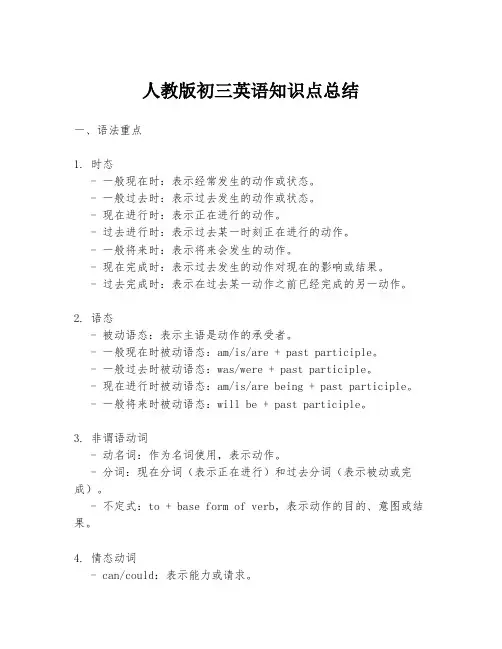
人教版初三英语知识点总结一、语法重点1. 时态- 一般现在时:表示经常发生的动作或状态。
- 一般过去时:表示过去发生的动作或状态。
- 现在进行时:表示正在进行的动作。
- 过去进行时:表示过去某一时刻正在进行的动作。
- 一般将来时:表示将来会发生的动作。
- 现在完成时:表示过去发生的动作对现在的影响或结果。
- 过去完成时:表示在过去某一动作之前已经完成的另一动作。
2. 语态- 被动语态:表示主语是动作的承受者。
- 一般现在时被动语态:am/is/are + past participle。
- 一般过去时被动语态:was/were + past participle。
- 现在进行时被动语态:am/is/are being + past participle。
- 一般将来时被动语态:will be + past participle。
3. 非谓语动词- 动名词:作为名词使用,表示动作。
- 分词:现在分词(表示正在进行)和过去分词(表示被动或完成)。
- 不定式:to + base form of verb,表示动作的目的、意图或结果。
4. 情态动词- can/could:表示能力或请求。
- may/might:表示可能性。
- must:表示必须或强烈义务。
- should/ought to:表示建议或应当。
5. 句子结构- 简单句:一个主语和一个谓语。
- 并列句:使用并列连词连接两个或多个简单句。
- 复合句:包含一个主句和至少一个从句。
- 定语从句:修饰名词或代词的从句。
- 状语从句:表示时间、地点、原因、条件、结果等。
二、词汇与短语1. 常见词汇- 描述人物特征的形容词:kind, honest, creative, etc.- 描述日常活动的动词短语:clean up, take out, turn off, etc.- 描述情感和情绪的名词:happiness, sadness, anger, etc. - 描述天气的词汇:sunny, rainy, windy, etc.2. 短语搭配- 动词短语搭配:finish doing, stop to do, remember to do, etc.- 形容词与介词的搭配:afraid of, interested in, good at, etc.- 常用口语表达:What's up?, How about…?, It's up to you, etc.三、阅读理解技巧1. 快速阅读(Skimming)- 快速浏览文章,抓住主旨大意。
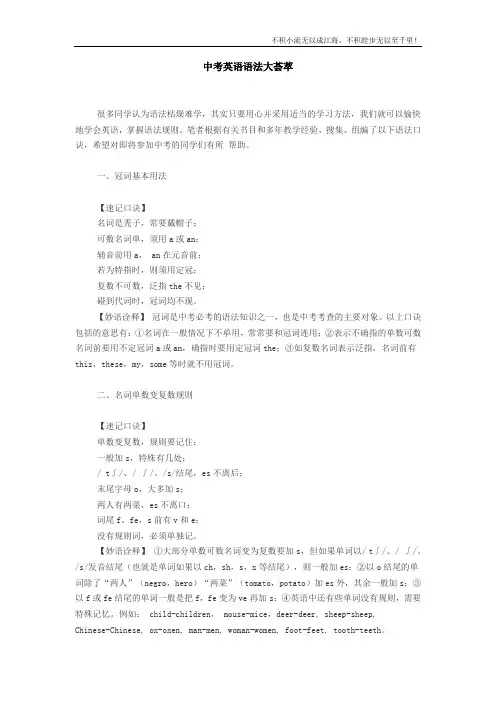
中考英语语法大荟萃很多同学认为语法枯燥难学,其实只要用心并采用适当的学习方法,我们就可以愉快地学会英语,掌握语法规则。
笔者根据有关书目和多年教学经验,搜集、组编了以下语法口诀,希望对即将参加中考的同学们有所帮助。
一、冠词基本用法【速记口诀】名词是秃子,常要戴帽子;可数名词单,须用a或an;辅音前用a, an在元音前;若为特指时,则须用定冠;复数不可数,泛指the不见;碰到代词时,冠词均不现。
【妙语诠释】冠词是中考必考的语法知识之一,也是中考考查的主要对象。
以上口诀包括的意思有:①名词在一般情况下不单用,常常要和冠词连用;②表示不确指的单数可数名词前要用不定冠词a或an,确指时要用定冠词the;③如复数名词表示泛指,名词前有this,these,my,some等时就不用冠词。
二、名词单数变复数规则【速记口诀】单数变复数,规则要记住;一般加s,特殊有几处;/ t∫/、/ ∫/、/s/结尾,es不离后;末尾字母o,大多加s;两人有两菜,es不离口;词尾f、fe,s前有v和e;没有规则词,必须单独记。
【妙语诠释】①大部分单数可数名词变为复数要加s,但如果单词以/ t∫/、/ ∫/、/s/发音结尾(也就是单词如果以ch,sh,s,x等结尾),则一般加es;②以o结尾的单词除了“两人”(negro,hero)“两菜”(tomato,potato)加es外,其余一般加s;③以f或fe结尾的单词一般是把f,fe变为ve再加s;④英语中还有些单词没有规则,需要特殊记忆。
例如: child-children, mouse-mice,deer-deer, sheep-sheep,Chinese-Chinese, ox-oxen, man-men, woman-women, foot-feet, tooth-teeth。
三、名词所有格用法【速记口诀】名词所有格,表物是“谁的”;若为生命词,加“’s”即可行,词尾有s,仅把逗号择;并列名词后,各自和共有,前者分别加,后者最后加;若为无生命词,of所有格,前后须倒置,此是硬规则。
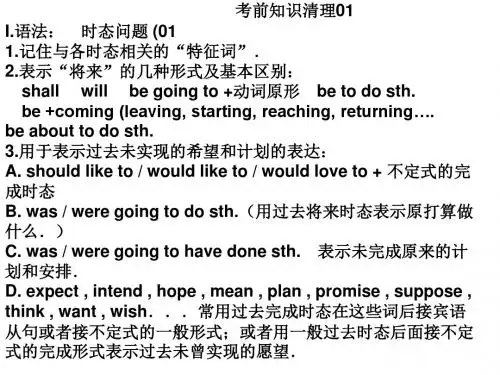

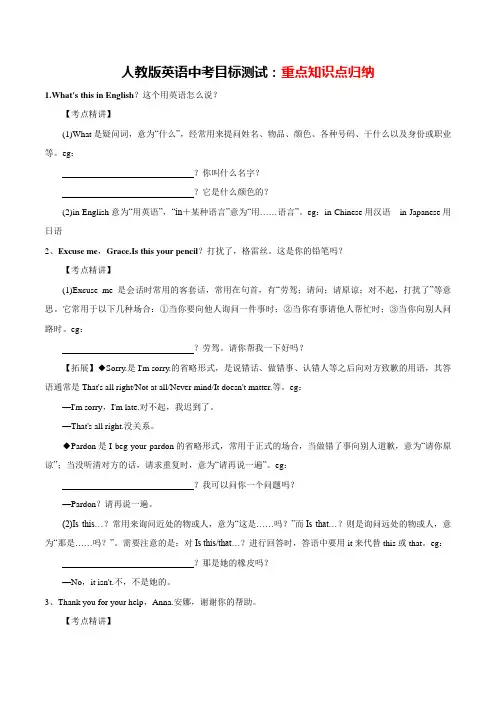
人教版英语中考目标测试:重点知识点归纳1.What's this in English?这个用英语怎么说?【考点精讲】(1)What是疑问词,意为“什么”,经常用来提问姓名、物品、颜色、各种号码、干什么以及身份或职业等。
eg:?你叫什么名字??它是什么颜色的?(2)in English意为“用英语”,“in+某种语言”意为“用……语言”。
eg:in Chinese用汉语in Japanese用日语2、Excuse me,Grace.Is this your pencil?打扰了,格雷丝。
这是你的铅笔吗?【考点精讲】(1)Excuse me是会话时常用的客套话,常用在句首,有“劳驾;请问;请原谅;对不起,打扰了”等意思。
它常用于以下几种场合:①当你要向他人询问一件事时;②当你有事请他人帮忙时;③当你向别人问路时。
eg:?劳驾。
请你帮我一下好吗?【拓展】◆Sorry.是I'm sorry.的省略形式,是说错话、做错事、认错人等之后向对方致歉的用语,其答语通常是That's all right/Not at all/Never mind/It doesn't matter.等。
eg:—I'm sorry,I'm late.对不起,我迟到了。
—That's all right.没关系。
◆Pardon是I beg your pardon的省略形式,常用于正式的场合,当做错了事向别人道歉,意为“请你原谅”;当没听清对方的话,请求重复时,意为“请再说一遍”。
eg:?我可以问你一个问题吗?—Pardon?请再说一遍。
(2)Is this…?常用来询问近处的物或人,意为“这是……吗?”而Is that…?则是询问远处的物或人,意为“那是……吗?”。
需要注意的是:对Is this/that…?进行回答时,答语中要用it来代替this或that。
eg:?那是她的橡皮吗?—No,it isn't.不,不是她的。
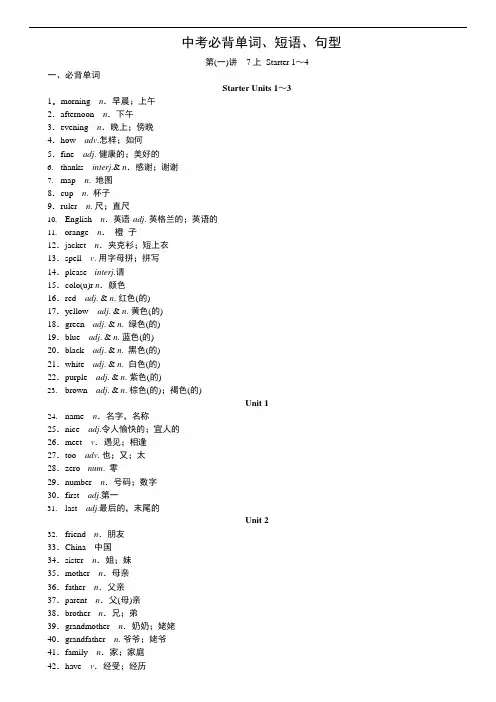
一、必背单词1.morning n.早晨;上午2.afternoon n.下午3.evening n.晚上;傍晚4.how adv.怎样;如何5.fine adj. 健康的;美好的6.thanks interj.& n.感谢;谢谢7.map n. 地图8.cup n. 杯子9.ruler n. 尺;直尺中考必背单词、短语、句型第(一)讲7 上Starter 1~4Starter Units 1~310.English n.英语adj. 英格兰的;英语的11.orange n.橙子12.jacket n.夹克衫;短上衣13.spell v. 用字母拼;拼写14.please interj.请15.colo(u)r n.颜色16.red adj. & n. 红色(的)17.yellow adj. & n. 黄色(的)18.green adj. & n. 绿色(的)19.blue adj. & n. 蓝色(的)20.black adj. & n. 黑色(的)21.white adj. & n. 白色(的)22.purple adj. & n. 紫色(的)23.brown adj. & n. 棕色(的);褐色(的) n.名字,名称25.nice adj.令人愉快的;宜人的26.meet v.遇见;相逢27.too adv. 也;又;太28.zero num. 零29.number n.号码;数字30.first adj.第一st adj.最后的,末尾的32.friend n.朋友33.China 中国34.sister n.姐;妹35.mother n.母亲36.father n.父亲37.parent n.父(母)亲38.brother n.兄;弟39.grandmother n.奶奶;姥姥40.grandfather n. 爷爷;姥爷41.family n.家;家庭42.have v.经受;经历Unit 1 Unit 243.cousin n.堂兄(弟、姊、妹);表兄(弟、姊、妹)44.aunt n.姑母;姨母;伯母;婶母;舅母45.uncle n.舅父;叔父;伯父;姑父;姨父46.daughter n.女儿47.photo n.照片48.next adj. & n. 下一个(的);接下来(的) 49.picture n. 照片;图画50.eraser n.橡皮51.dictionary n.词典;字典52.excuse v.原谅;宽恕53.thank v.感谢;谢谢54.teacher n.老师;教师55.help v. & n.帮助;援助56.welcome adj.受欢迎的57.baseball n.棒球58.watch n.表;手表59.computer n.计算机;电脑60.card n.卡片61.notebook n.笔记本62.ring n.戒指63.library n.图书馆64.ask v.请求;要求;询问65.find v.找到;发现66.some adj.一些;某些pron.有些;有的67.email n.电子邮件68.call v.打电话69.lost v.遗失;丢失70.must modal v.必须71.table n.桌子72.bed n.床73.chair n.椅子74.under prep.在……下75.desk n.书桌76.hat n.帽子77.know v.知道;了解78.radio n.收音机;无线电广播79.clock n.时钟80.everywhere adv.处处;到处;各个地方81.always adv.总是二、重点短语1.good morning 早上好2.good afternoon 下午好3.good evening 晚上好4.name list 名单5.in English 用英语6.what color 什么颜色7.telephone /phone number 电话号码Unit 3 Unit 48.first name 名字9.last name 姓10.middle school 中学11.have a good day 过得愉快12.two photos of my family 两张我家的全家福13.in the first photo 在第一张照片里14.the name of ……的名字15.pencil box 铅笔盒;文具盒16.excuse me 劳驾,请原谅17.ID card 学生卡18.Lost and Found 失物招领处19.email sb. at ... 发邮件给某人至……20.call sb. at ... 拨打电话……找某人21.a set of keys 一串钥匙22.ask ...for ... 请求;恳求(给予)23.on the sofa 在沙发上24.come on 快点儿25.tape player 录音机26.model plane 飞机模型27.on the teacher's desk 在讲桌上28.the key to ............... 的钥匙;……的答案三、必背句型1.What's this in English?这个用英语怎么说?2.What color is it?它是什么颜色的?3.Nice/Glad to meet you.见到你很高兴。
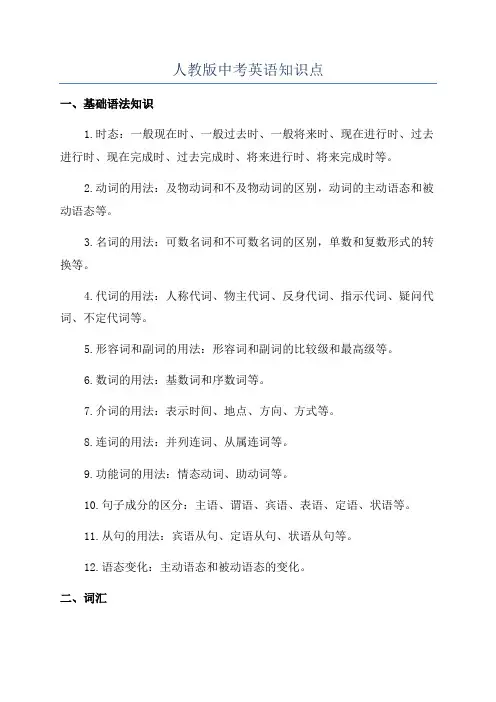
人教版中考英语知识点一、基础语法知识1.时态:一般现在时、一般过去时、一般将来时、现在进行时、过去进行时、现在完成时、过去完成时、将来进行时、将来完成时等。
2.动词的用法:及物动词和不及物动词的区别,动词的主动语态和被动语态等。
3.名词的用法:可数名词和不可数名词的区别,单数和复数形式的转换等。
4.代词的用法:人称代词、物主代词、反身代词、指示代词、疑问代词、不定代词等。
5.形容词和副词的用法:形容词和副词的比较级和最高级等。
6.数词的用法:基数词和序数词等。
7.介词的用法:表示时间、地点、方向、方式等。
8.连词的用法:并列连词、从属连词等。
9.功能词的用法:情态动词、助动词等。
10.句子成分的区分:主语、谓语、宾语、表语、定语、状语等。
11.从句的用法:宾语从句、定语从句、状语从句等。
12.语态变化:主动语态和被动语态的变化。
二、词汇1.常用词汇的记忆:时态、语态、动词、名词、代词、形容词、副词、介词、连词、感叹词、频度副词、情态动词、冠词、人称代词、物主代词等。
2.词义辨析:同义词和近义词的辨析。
3.词根、词缀的了解和运用。
4.拓展词汇:同义词、反义词、接近词、派生词等。
三、听力技巧1.正确使用听力材料前的时间,通过查阅听力材料的背景信息,对题目进行适当的预测。
2.注意听力材料的主要内容,抓住关键词,同时注意关注细节。
3.学会辨别转折词、数词、位置、时间等关键信息。
4.通过听力材料获得答案时,要注意时态的转换。
四、阅读技巧1.对题目进行预测,通过阅读标题、段落的开头和结尾等来猜测文章的主旨。
2.快速阅读文章,抓住关键词和短语。
3.根据题目要求找出关键信息,定位答案。
4.了解文章的基本结构,掌握一些常见的表达方式和句式结构。
5.注意阅读文章中的标点符号和连接词,理解长难句的意思。
五、写作技巧1.选择题材,在写作前进行头脑风暴,确定写作的主题和中心思想。
2.合理组织写作框架,包括开头、主体和结尾,注意段落之间的过渡。
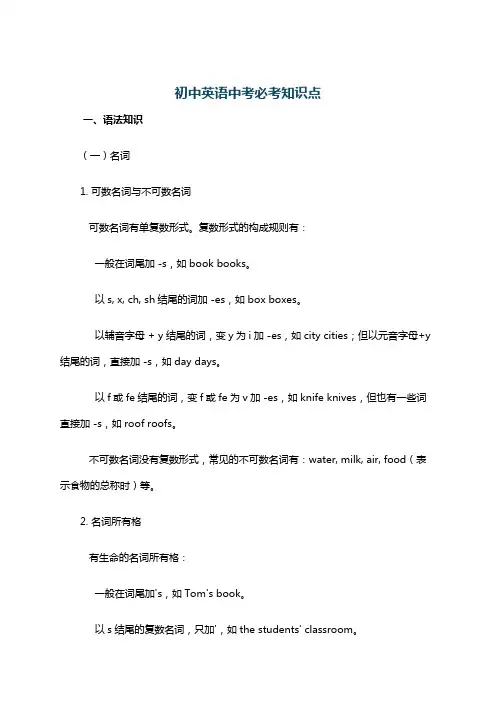
初中英语中考必考知识点一、语法知识(一)名词1. 可数名词与不可数名词可数名词有单复数形式。
复数形式的构成规则有:一般在词尾加 -s,如book books。
以s, x, ch, sh结尾的词加 -es,如box boxes。
以辅音字母 + y结尾的词,变y为i加 -es,如city cities;但以元音字母+y 结尾的词,直接加 -s,如day days。
以f或fe结尾的词,变f或fe为v加 -es,如knife knives,但也有一些词直接加 -s,如roof roofs。
不可数名词没有复数形式,常见的不可数名词有:water, milk, air, food(表示食物的总称时)等。
2. 名词所有格有生命的名词所有格:一般在词尾加's,如Tom's book。
以s结尾的复数名词,只加',如the students' classroom。
表示两者或两者以上共同拥有时,只在最后一个名词后加's;表示各自拥有时,每个名词后都加's。
例如:Lucy and Lily's mother(她们共同的妈妈);Lucy's and Lily's rooms(她们各自的房间)。
无生命的名词所有格常用“of + 名词”结构,如the window of the room。
(二)代词1. 人称代词主格:I, you, he, she, it, we, you, they,在句中作主语。
例如:I like English.宾格:me, you, him, her, it, us, you, them,在句中作宾语。
例如:He helps me.2. 物主代词形容词性物主代词:my, your, his, her, its, our, your, their,后面要接名词。
例如:This is my book.名词性物主代词:mine, yours, his, hers, its, ours, yours, theirs,相当于“形容词性物主代词+名词”。
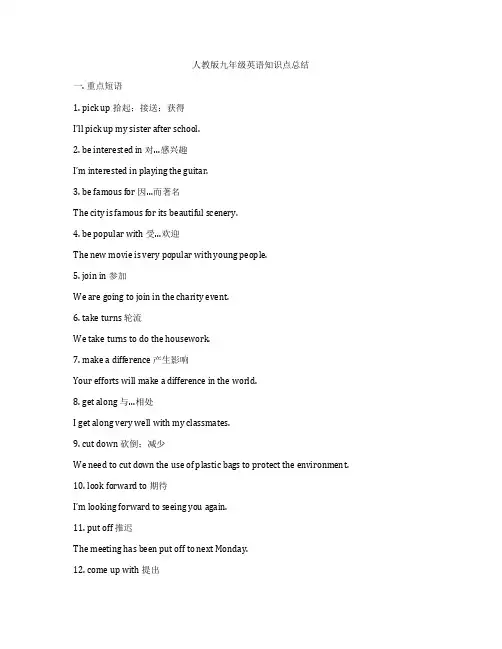
人教版九年级英语知识点总结一. 重点短语1. pick up 拾起;接送;获得I’ll pick up my sister after school.2. be interested in 对…感兴趣I’m interested in playing the guitar.3. be famous for 因…而著名The city is famous for its beautiful scenery.4. be popular with 受…欢迎The new movie is very popular with young people.5. join in 参加We are going to join in the charity event.6. take turns 轮流We take turns to do the housework.7. make a difference 产生影响Your efforts will make a difference in the world.8. get along 与…相处I get along very well with my classmates.9. cut down 砍倒;减少We need to cut down the use of plastic bags to protect the environment.10. look forward to 期待I’m looking forward to seeing you again.11. put off 推迟The meeting has been put off to next Monday.12. come up with 提出We need to come up with a plan for the project. 13. keep in touch 保持联系We keep in touch by sending emails.14. make up 编造;弥补She made up a story about why she was late.15. run out of 用完We have run out of milk and need to buy some more.二. 重点语法1. 一般现在时肯定句:主语 + V原 + 其他He plays football every weekend.否定句:主语 + do not/does not + V原 + 其他I do not like watching horror movies.疑问句:Do/Does + 主语 + V原 + 其他Do they enjoy playing basketball?2. 一般过去时肯定句:主语 + V-ed/Vt + 其他She visited Beijing last year.否定句:主语 + did not + V原 + 其他We did not go to the concert last night.疑问句:Did + 主语 + V原 + 其他Did you finish your homework yesterday?3. 现在进行时肯定句:主语 + am/is/are + V-ing + 其他She is watching TV now.否定句:主语 + am/is/are + not + V-ing + 其他He is not playing football at the moment.疑问句:Am/Is/Are + 主语 + V-ing + 其他Are you studying for the exam?4. 一般将来时肯定句:主语 + will + V原 + 其他She will travel to Japan next month.否定句:主语 + will not + V原 + 其他I will not forget to call you.疑问句:Will + 主语 + V原 + 其他Will he come to the party?5. 现在完成时肯定句:主语 + have/has + V过去分词 + 其他They have finished their homework.否定句:主语 + have/has + not + V过去分词 + 其他We have not seen this movie yet.疑问句:Have/Has + 主语 + V过去分词 + 其他Have you ever been to Paris?6. 被动语态肯定句:主语 + am/is/are + V过去分词 + 其他The book is written by my favorite author.否定句:主语 + am/is/are + not + V过去分词 + 其他The dishes are not washed by my brother.疑问句:Am/Is/Are + 主语 + V过去分词 + 其他Is the car fixed by the mechanic?三. 重点词汇1. 人物teacher 老师student 学生doctor 医生nurse 护士engineer 工程师pilot 飞行员musician 音乐家actor 演员writer 作家scientist 科学家athlete 运动员2. 动作run 跑步jump 跳跃swim 游泳dance 跳舞sing 唱歌play 演奏climb 爬山cook 烹饪paint 绘画ride 骑行3. 环境house 房子school 学校hospital 医院office 办公室library 图书馆park 公园beach 海滩mountain 山river 河lake 湖四. 重点句型1. 八大情态动词can 能够I can speak English fluently.could 过去能够She could play the piano when she was five. may 可能May I go to the restroom, please?might 可能It might rain this afternoon.must 必须You must finish your homework before 8pm. shall 将要Shall we go to the movies tonight?should 应该You should study for the exam tomorrow.will 将要We will visit the Great Wall next week.2. 祈使句Be quiet! 安静!Don’t be late! 别迟到!Sit down, please. 请坐下。
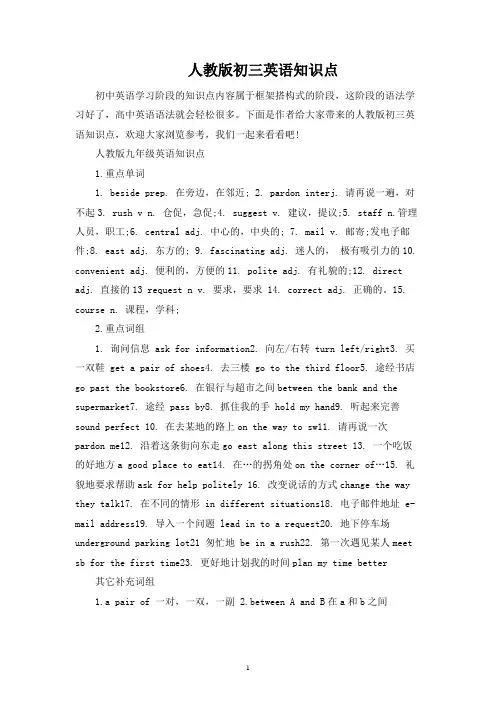
人教版初三英语知识点初中英语学习阶段的知识点内容属于框架搭构式的阶段,这阶段的语法学习好了,高中英语语法就会轻松很多。
下面是作者给大家带来的人教版初三英语知识点,欢迎大家浏览参考,我们一起来看看吧!人教版九年级英语知识点1.重点单词1. beside prep. 在旁边,在邻近;2. pardon interj. 请再说一遍,对不起3. rush v n. 仓促,急促;4. suggest v. 建议,提议;5. staff n.管理人员,职工;6. central adj. 中心的,中央的;7. mail v. 邮寄;发电子邮件;8. east adj. 东方的;9. fascinating adj. 迷人的,极有吸引力的10. convenient adj. 便利的,方便的11. polite adj. 有礼貌的;12. direct adj. 直接的13 request n v. 要求,要求 14. correct adj. 正确的。
15. course n. 课程,学科;2.重点词组1. 询问信息 ask for information2. 向左/右转 turn left/right3. 买一双鞋 get a pair of shoes4. 去三楼 go to the third floor5. 途经书店go past the bookstore6. 在银行与超市之间between the bank and the supermarket7. 途经 pass by8. 抓住我的手 hold my hand9. 听起来完善sound perfect 10. 在去某地的路上on the way to sw11. 请再说一次pardon me12. 沿着这条街向东走go east along this street 13. 一个吃饭的好地方a good place to eat14. 在…的拐角处on the corner of…15. 礼貌地要求帮助ask for help politely 16. 改变说话的方式change the way they talk17. 在不同的情形 in different situations18. 电子邮件地址 e-mail address19. 导入一个问题 lead in to a request20. 地下停车场underground parking lot21 匆忙地 be in a rush22. 第一次遇见某人meet sb for the first time23. 更好地计划我的时间plan my time better 其它补充词组1.a pair of 一对,一双,一副2.between A and B在a和b之间3.on one’s / the way to 在去……的路上4.pardon me 什么,请再说一遍5.pass by 途经经过6.look forward to 盼望期待7.excuse me 打扰了请谅解 8.get some magazines 得到一些杂志9.get some information about 获取有关……的一些信息10.turnleft\right 向左\向右转11.go past 经过途经 12.a little earlier 早一点儿13.a good place to eat 一个吃饭的好地方 14.in different situation 在不同的情形下15.on time 准时按时 16.get to 到达17.have dinner 吃晚餐18.on one’s / \the right在右边19Xe on 快点请过来 20.the shopping center 购物中心21.the corner of....... 的角落/拐角处 22.lead into 导入引入3.重点句式1. ---请问,你能告知我怎样才能到书店吗?---当然,只需沿主街走只到你途经中心街。
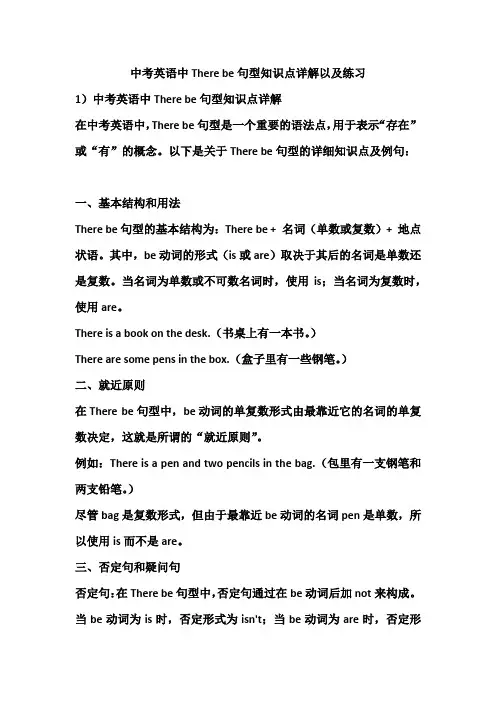
中考英语中There be句型知识点详解以及练习1)中考英语中There be句型知识点详解在中考英语中,There be句型是一个重要的语法点,用于表示“存在”或“有”的概念。
以下是关于There be句型的详细知识点及例句:一、基本结构和用法There be句型的基本结构为:There be + 名词(单数或复数)+ 地点状语。
其中,be动词的形式(is或are)取决于其后的名词是单数还是复数。
当名词为单数或不可数名词时,使用is;当名词为复数时,使用are。
There is a book on the desk.(书桌上有一本书。
)There are some pens in the box.(盒子里有一些钢笔。
)二、就近原则在There be句型中,be动词的单复数形式由最靠近它的名词的单复数决定,这就是所谓的“就近原则”。
例如:There is a pen and two pencils in the bag.(包里有一支钢笔和两支铅笔。
)尽管bag是复数形式,但由于最靠近be动词的名词pen是单数,所以使用is而不是are。
三、否定句和疑问句否定句:在There be句型中,否定句通过在be动词后加not来构成。
当be动词为is时,否定形式为isn't;当be动词为are时,否定形式为aren't。
例如:There isn't a cat in the room.(房间里没有猫。
)There aren't any apples on the table.(桌子上没有苹果。
)疑问句:将be动词提到句首,形成一般疑问句。
肯定回答用Yes, there is/are;否定回答用No, there isn't/aren't。
例如:Is there a TV in your bedroom?(你的卧室里有电视吗?)Yes, there is.(是的,有。
人教版初中英语中考80个重要考点1.much,a little, even, still等表示程度的副词可用来修饰比较级;而very, too, so, quite(表示身体健康的quiter除外)习惯上不用来修饰比较级。
2.arrive in +大地点/ arrive at +小地点= get to … = reach +…3.Let’s +动词原形4.长,宽,高的表达法:数字+量词+形容词。
如:20 metres wide二十米宽5.stop doing sth 停止正在做的事情6.stop to do sth 停下(正在做的事情)来做另一件事7.stop sb from doing sth 阻止某人干某事8.can’t stop doing sth 情不自禁干某事9.There is +单数可数名词/不可数名词+ 地点状语.10.How many+复数名词+are there+介词短语?11.remember to do sth 记得将要干某事(事没做)12.remember doing sth .记得曾经做过某事(事已做)13.在季节、月份、星期、节日、球类运动、棋类游戏的名词之前不用冠词。
14.would like to do sth 想要做某事15.How about /What about doing sth ?= Why not do sth ?询问意见/建议16.It’s time for sth 该到某事的时间了17.It’s time to do sth该到干某事的时间了18.have fun doing sth 很高兴干某事19.make sb do sth 使某人干某事20.can’t afford to do sth 没有足够多钱干某事21.can’t stand doing sth 不能忍受干某事22.mind doing sth 介意干某事23.try to do sth 尽力干某事24.finish doing sth 结束干某事25.decide to do sth 决定干某事26.plan to do sth 计划干某事27.It +takes +sb.+时间+to do sth28.sb. +spend +时间+on sth (in doing sth )29.Can you do sth ?你可以做,,,吗30.be busy doing sth 忙于干某事31.called = named = with the name (of)32.at the age of = when sb was/ were ….33.because of 后面接名词、代词、名词性短语、what从句34.keep doing sth . 表示不间断地持续做某事或一直做某事。
人教版中考英语中考英语总复习过去进行时知识点总结一、初中英语过去进行时1.It when I my homework last night. ()A. raining, didB. rained, was doingC. was raining, doD. rains, was doing【答案】 B【解析】【分析】句意:昨晚当我正在做作业时,下雨了。
结合语境可知主句描述的是过去发生的动作,故用一般过去时态。
从句中描述的是过去某时正在进行的动作,故用过去进行时态。
选B。
【点评】英语中的时态主要是借助于时间状语与上下文语境来进行判断。
解答此类题型,首先要注意句子中的时间状语,如果没有则要通过分析上下文,结合语境来判断句子的时态。
英语疑问句中一般具有时态上的对应关系,注意结合这一特点进行区分。
2.Tom said he ____basketball with his classmates from 4:00 to 6:00 yesterday afternoon.A. is playedB. was playingC. playsD. had played【答案】 B【解析】【分析】句意:汤姆说他昨天下午4点到6点正在和同学一起打篮球。
A.被打;B.正在打;C.打,三单式;D.打,过去完成时。
根据from 4:00 to 6:00 yesterday afternoon可知用过去进行时,其构成为was/ were doing,主语是he,第三人称单数,be动词用was,故答案选B。
【点评】考查动词的时态。
注意过去进行时的用法。
3.—What were you doing at this time yesterday?—I ________on the grass and drawing a picture.A. sitB. satC. am sittingD. was sitting【答案】 D【解析】【分析】句意:—昨天这个时候你在做什么?—我正坐在草地上画画。
人教版|九年级全册各单元必考知识点大全Unit1【重点短语】1. have conversation with sb. 同某人谈话2. too…to…太……而不能3. the secret to………的秘诀4. be afraid of doing sth./ be afraid to do sth. 害怕做某事5. look up 查阅6. repeat out loud 大声跟读7. make mistakes in 在……方面犯错误8. connect ……with…把……和……连接/联系起来9. get bored 感到厌烦10. be stressed out 焦虑不安的11. pay attention to 注意;关注12. depend on 取决于;依靠13. the ability to do sth.. 做某事的能力【考点详解】1. by + doing 通过……方式(by是介词,后面要跟动名词,也就是动词的ing 形式)2. talk about 谈论,议论,讨论The students often talk about movie after class. 学生们常常在课后讨论电影。
talk to sb= talk with sb 与某人说话3. 提建议的句子:①What/ how about +doing sth.? 做…怎么样?(about后面要用动词的ing形式,这一点考试考的比较多)如:What/ How about going shopping?②Why don't you + do sth.? 你为什么不做…?如:Why don't you go shopping?③Why not + do sth. ? 为什么不做…?如:Why not go shopping?④Let's + do sth. 让我们做…...吧。
如:Let's go shopping⑤Shall we/I + do sth.? 我们/我...…好吗?如:Shall we/I go shopping?4. a lot 许多,常用于句末。
九年级人教英语知识点总结英语是一门重要的学科,在九年级学生需要对所学的英语知识进行总结和复习。
下面是九年级人教英语知识点的详细总结。
一、词汇1. 动词时态:九年级学生应该掌握各种动词时态的用法,包括一般现在时、一般过去时、一般将来时、现在进行时、过去进行时、现在完成时等。
2. 名词复数:九年级学生需要掌握名词复数形式的规则,以及一些特殊名词的复数形式。
3. 形容词与副词:九年级学生应该熟悉形容词和副词的用法,并能正确地在句子中使用它们。
4. 介词:九年级学生需要掌握常见的介词用法,包括介词的位置、固定搭配等。
5. 链接词:九年级学生应该掌握各种链接词的用法,包括并列连词、转折连词、因果连词等。
二、语法1. 时态:九年级学生应该理解各种时态的含义和用法,并能在句子中灵活运用。
2. 从句:九年级学生需要掌握主从复合句中从句的用法,包括宾语从句、主语从句、宾语补足语从句等。
3. 并列句与复合句:九年级学生应该了解并列句和复合句的结构和用法,并能正确地使用它们。
4. 省略:九年级学生需要理解省略的概念和常见的省略情况,如主语、谓语、宾语的省略等。
5. 句子成分:九年级学生需要学会分辨句子中的各种成分,如主语、谓语、宾语、定语、状语等。
三、阅读理解1. 短文理解:九年级学生应该能够在短文中捕捉关键信息,理解文章的主旨,并能回答与文章内容相关的问题。
2. 推理判断:九年级学生应该能够根据文章的暗示和线索进行推理判断,推测出作者的意图和观点。
3. 词义推测:九年级学生需要根据上下文的提示推测生词的意思,提高阅读理解的能力。
四、写作1. 书面表达:九年级学生需要掌握书面表达的基本要求,包括语言的准确性、连贯性和流畅性等。
2. 写作技巧:九年级学生应该学会使用一些写作技巧,如使用过渡词、添加细节、运用比喻等,提高文章的质量。
3. 作文类型:九年级学生需要熟悉不同类型的作文,如记叙文、说明文、议论文等,并能根据要求进行写作。
中考英语语法知识归纳总结人教版中考英语语法知识归纳总结(人教版)1. 一般现在时(Simple Present Tense)一般现在时用于描述经常性或总是发生的动作或情况。
主语为第三人称单数时,动词要加s或es。
2. 一般过去时(Simple Past Tense)一般过去时用于过去发生的动作或状态。
动词的过去式通常是加ed,但也存在一些不规则动词。
3. 现在进行时(Present Continuous Tense)现在进行时用于描述现在正在进行的动作,动词后要加ing。
4. 一般将来时(Simple Future Tense)一般将来时用于表示将来发生的动作,通常在动词前加will或be going to。
5. 情态动词(Modal Verbs)情态动词是一类特殊的动词,用于表示能力、可能性、许可、义务、建议等。
常见的情态动词有can、could、may、might、shall、should、will、would、must等。
6. 被动语态(Passive Voice)被动语态是指不直接说明动作的主体,而是将动作所受的影响或动作的承受者放在句子的主语位置。
主动句的主语变为被动句的宾语,谓语动词由“be+过去分词”构成。
7. 状语从句(Adverbial Clauses)状语从句用于修饰句子中的动词、形容词或副词,常见的包括时间状语从句、地点状语从句、条件状语从句、原因状语从句、结果状语从句等。
8. 定语从句(Adjective Clauses)定语从句用于修饰名词或代词,来限定或说明其意义。
引导定语从句的关联词有who、which、that、whose等。
9. 名词性从句(Noun Clauses)名词性从句用作句子的主语、宾语、表语等成分。
常见的名词性从句有主语从句、宾语从句、表语从句和同位语从句等。
10. 直接引语和间接引语(Direct and Indirect Speech)直接引语是直接引述别人的话,需用引号括起来;间接引语是将别人的话间接转述,需进行相应的句法和时态变化。
1 (see 、hear 、notice 、find 、feel 、listen to 、look at (感官动词)+ doeg :I like watching monkeys jump2 (比较级and 比较级)表示越来越怎么样3 a piece of cake =easy 小菜一碟(容易)补:a place of interest 名胜4 agree with sb 赞成某人5 all kinds of 各种各样 a kind of 一样6 all over the world = the whole world 整个世界7 along with 同……一道,伴随……eg : I will go along with you 我将和你一起去the students planted trees along with their teachers 学生同老师们一起种树8 As soon as 一怎么样就怎么样9 as you can see 你是知道的10 ask for ……求助向…要…(直接接想要的东西)eg : ask you for my book11 ask sb for sth 向某人什么12 ask sb to do sth 询问某人某事ask sb not to do 叫某人不要做某事13 at the age of 在……岁时eg:I am sixteen I am at the age of sixteen14 at the beginning of …………的起初;……的开始15 at the end of +地点/+时间最后;尽头;末尾eg : At the end of the day16 at this time of year 在每年的这个时候补:at least 至少17 be /feel confident of sth /that clause +从句感觉/对什么有信心,自信eg : I am / feel confident of my spoken English I feel that I can pass the test18 be + doing 表:1 现在进行时2 将来时19 be able to (+ v 原) = can (+ v 原)能够……eg : She is able to sing She can sing 补:base on 以…(为)根据20 be able to do sth 能够干什么eg :she is able to sing21 be afraid to do (of sth 恐惧,害怕……eg : I'm afraed to go out at night I'm afraid of dog22 be allowed to do 被允许做什么eg: I'm allowed to watch TV 我被允许看电视I should be allowed to watch TV 我应该被允许看电视23 be angry with sb 生某人的气eg : Don't be angry with me24 be angry with(at) sb for doing sth 为什么而生某人的气25 be as…原级…as 和什么一样eg : She is as tall as me 她和我一样高26 be ashamed to27 be away from 远离28 be away from 从……离开29 be bad for 对什么有害eg : Reading books in the sun is bad for your eyes 在太阳下看书对你的眼睛不好30 be born 出生于31 be busy doing sth 忙于做什么事be busy with sth 忙于……32 be careful 当心;小心be close to…离…很近33 be different from……和什么不一样34 be famous for 以……著名35 be friendly to sb 对某人友好36 be from = come from 来自eg :He is from Bejing He comes from Bejing Is he from Bejing ? Does he come from Bejing ?37 be full of 装满……的be filled with 充满eg: the glass is full of water the glass is filled with water38 be glad+to+do/从句39 be going to + v(原)将来时40 be good at(+doing) = do well in 在某方面善长, 善于……41 be good for 对什么有好处eg : Reading aloud is good for your English42 be happy to do 很高兴做某事43 be helpful to sb 对某人有好处eg : Reading aloud is helpful to you 大声朗读对你有好处Exercising is helpful to your bady 锻炼对你的身体有好处44 be in good health 身体健康45 be in trouble 处于困难中eg : She is in trouble They are in tronble46 be interested in 对某方面感兴趣47 be late for = come late to 迟到eg: Be late for class 上课迟到48 be like 像……eg : I'm like my mother49 be mad at 生某人的气50 be made from 由……制成(制成以后看不见原材料) 补:be made in 在…生产或制造51 be made of 由……制成(制成以后还看得见原材料)52 be not sure 表不确定53 be on a visit to 参观54 be popular with sb 受某人欢迎补:be please with 对…感到满意55 be quiet 安静56 be short for 表**的缩写eg: 陶is short for 陶俊杰57 be sick in bed 生病在床58 be sorry to do sth be sorry for sb eg : I am sorry for you59 be sorry to hear that60 be sorry to trouble sb eg : I am sorry to trouble you61 be strict in doing sth 严于做某事eg : He's strict in obeying noles62 be strict with sb 对某人要求严格eg: Some students are not strict with them selves 这些学生对自己不严格63 be strict with sb in sth 某方面对某人严格64 be supposed to do 被要求干什么65 be sure 表确定66 be sure of doing sth 对做某事有信心eg: He is sure of winning I am sure of learning English well67 be sure of sth 对做某事有信心eg: I'm sure of my head (my teacher 我相信我的大脑(老师)68 be sure that sth 对做某事有信心eg: I'm suer that he can pass the test 我相信他能通过考试69 be sure to do sth 一定会做某事eg: We are sure to pass the test 我们一定会通过这次考试We are sure to learn English well 我们一定能学好英语70 be terrified of + 名/动doing 害怕……71 be terrified to do sth 害怕做某事72 be the same as …和什么一样73 be used to doing sth 习惯做某事eg: My father is used to getting up early 我爸爸习惯早起He is used to sleeping in class 他习惯上课睡觉He is used to working hard He is used to hard work 他习惯努力工作74 be worth doing 值得做什么75 be(feel) afraid to do sth 害怕做某事be afraid of sth 害怕某物be afraid that 丛句76 because+句子because of +短语eg : He was late because he had a headache He was late because of his headache77 begin to do = start to do 开始做某事start…with…=begin…with…以什么开始什么eg : Let's begin the game with the song I begin to go home78 between…and…两者之间79 borrow sth from sb 向……借……lend sth to sb ( lend sb sth 借给……什么东西eg : I borrowed a pen from him he lent a pen to me ( he lent me a pen80 both = the same(as) = not different(from) 表相同81 bother 打扰bother sb to do sth 补:both…and… …和…都eg : I'm sorry to bother you ,but can you tell me to way to the station我十分道歉打扰你,但是你能告诉我怎么去车站the problem has been bothering me for weeks 这个问题困扰了我几个周了He's bothering me to lend him money82 by the end of 到……为止83 call sb sth eg : We call him old wang84 care 关心eg : Don't you care about this country's future ?你为什么不关心国家的未来85 catch up with sb 赶上某人86 chat with sb 和某人闲谈take sb to + 地点带某人去某地87 come in 进来88 come over to 过来89 come up with 提出eg: Can you come up with a good idea 你能想出一个好办法吗?90 communicate with sb 和某人交流91 consider + doing 考虑做什么eg : Why not consider going to lu zhou 为什么不考虑去泸州?92 dance to 随着……跳舞eg : She likes dancing to the music 她喜欢随着音乐跳舞93 decide to do sth 决定做某事94 do a survey of 做某方面的调查95 do better in 在……方面做得更好补:do well in 在……方面干的好96 do wrong 做错补:droup off 放下(某物)97 Don't forget to do sth 不要忘了做某事98 Don't mind +doing /从句/名词不要介意……99 each +名(单)每一个……eg : Each student has many books 每一个学生都有一些书100 end up +doing101 enjoy +doing 喜欢102 escape from 从……逃跑eg: The prisoners have escaped from the prison 犯人从监狱里逃跑出来Some gas is escaping from the pipe 有一些气体从管子里冒出103 expect to do sth 期待做某事104 fall down 摔下来fall off 从哪摔下来105 fall in love with sb /sth 爱上什么106 far from 离某地远eg : The school is far from my home107 find +it +adj +to do 发现做某事怎么样108 find sb/sth +adj 发现什么怎么样?eg : I find the book interesting109 finish 完成+doing(名词)110 fit to sb = be fit for sb 适合某人111 forget to do 没有做而忘了forget doing 做了而又忘了eg: Don't forget to go home I forget closing door112 from…to…从某某到某某eg: From me for her113 get /have sth down 做完,被(别人)做……eg: I have my hair cut 我理了发(头发被剪了)Tom got his bad tooth pulled out 汤母把他的坏牙拔掉了(被牙医拔掉了)114 get a part-time job = find a part-time job115 get along well with sb = get on well with sb 与某人相处得好116 get along with sb = get on with sb 与某人相处117 get ready for = be ready for 为什么而准备eg : I get ready for math I am ready for math 补:get…bake 退还…118 get sb in to trouble 给某人麻烦119 get sb to do sth get out of 从…取出120 get…from…从某处得到某物121 give a talk 做报告eg: He is give a tall122 give sth to sb give sb sth 给某人某物123 go fish 钓鱼go swimming 游泳补:go over 过一遍;仔细检查124 go on to do 去做下一件事go on doing 继续做这件事125 go out away from go out of126 go to school 上学(用于专业的)go to the school 去学校(不一定是上学)127 good way to 好方法128 hate to do 讨厌没做过的事hate doing 讨厌做过的事129 have a party for sb 举办谁的晚会130 have a talk 听报告谈一谈131 have been doing 现在完成进行时eg : You have been talking You have been sleeping since132 have been to …( 地方)……去过某过地方have gone to …(地方)去了某地还没回来had better(not) do sth 最好(不要)做某事133 have fun +doing 玩得高兴134 have sth to do 有什么事要做eg: I have a lot of homework to do 我有很多家庭作业要做I have nothing to do 我没什么事情做135 have to do sth 必须做某事have sth done 请某人做某事136 have trouble (problem) (in) doing sth 做什么事情有麻烦137 have…time +doing have no time to do sth没有时间做某事138 have…(时间)…off 放……假eg: I have month off 我请一个月得假139 hear sb +do/doing 听见某人做某事/正在做某事140 help a lot 很大用处141 help sb with sth \one's sth 帮助某人某事(某方面)help sb (to) do sth 帮助某人做某事142 hope to do sth 希望做某事143 How about(+doing) = What about(+doing)144 how do you like = what do you think of 你对什么的看法145 if : 是否=whethereg: I don't know if (whether) I should go to the party 我不知道我是否应该去参加晚会He don't know if (whether) we will arrive on time tomorrow morning 他不知道我们明天早上是否能准时到达146 if :如果,假如(全部接一般时态)+条件语态从句eg: I'll go to LuZhou if it does't rain 假如明天不下雨,我就去泸州If they change the plan they will let me know 假如他们要改变计划,他们会让我知道的I'll go to England ,if I have enough money next year 如果我明年由足够的钱,我就要去英国147 in one's opinion = sb think 某人认为148 in some ways 在某些方面149 in the end = finally(adv) 最后150 in the north of…什么在什么的北方(north 北sowth 南west 西east 东)151 in the sun 在太阳下152 increase 增加eg : They've increased the prece of petrol by 3% 他们把石油价增加了3%the population has increased from 12 million ten years ago to 18 million now153 instead of +(名)代替eg: I'd like an apple instead of a pear 我想要苹果,而不要梨子I like English instead of math 我喜欢英语而不喜欢数学154 introduce sb to sb 介绍某人给某人introduce oneself 自我介绍155 invite sb to do sth 邀请某人做某事156 It takes sb sometime to do sth 做某人花掉某人多少时间eg : It took me 5 minutes to do my homework It takes me half an hour to cook157 It's +adj +for sb to do sth 对某人来说做某事怎么样158 It's +adj +to do 做某事怎么样159 It's +adj for sb 对于某人来说怎么样It's +adj of sb 对某人来说太怎么样160 It's +adj(for sb) to do(对某人来说)做某事怎么样It's +adj of sb to do sth 对某人来说做某事太怎么样eg : It's nice of you to help me with my English161 It's a good idea for sb to do sth 对……来说是个好主意162 It's important to sb 对某人来说很重要eg: It's important to me163 It's time to do sth It's time for sth 到了该去做某事的时间eg : It's time to have class It's time for class 该去上课了164 join = take part in 参加165 just now 刚才166 keep +sb /sth +adj /介词短语让什么保持什么样?167 keep out 不让……进入168 keep sb adj 让……保持……eg: I want to keep my mother happy keep healthy 保持健康169 key to +名词表示:某物的钥匙或某题的答案170 key to…anser to …key 可以是答题或钥匙171 laugh at…取笑……eg : Don't langh at others We langhed at the joke172 learn by oneslfe 自学learn from 从…学习173 learn from sb 向某人学习eg: We should learn from Lei Feng174 learn to do sth 学做某事learn something by heart 背诵记熟175 let sb do sth 让某人做某事lend something to somebody把某物借给某人176 Let sb down 让某人失望eg :We shouldn't let our farents down 我们不应该让我们的父母失望177 live from :离某地远178 live in +大地方/at +小地方居住在某地eg: I live in LuZhou She lives at XuanTan179 look after = take care of 照顾照看180 lose one's way 谁迷路eg : Lose your way 你迷路181 make a decision to do sth 决定做某事补:make a contribution to doing 贡献给182 make friends with sb 和谁成为朋友eg : I want to make friends with you183 make it early 把时间定的早一点184 make on exhibition of oneself 让某人出洋相185 make sb /n +n 使什么成为什么eg : I made her my step moller I made you my wife186 make sb /sth +adj 使某人(某物)怎么样eg : You must made your bed clean187 make sb /sth adj 使某人/某物怎么样188 make sb do sth 让某人做某事eg : I made him write 我以前让他写189 make up one's mind190 make…difference to…191 mind sb to do mind one's doing 介意……做什么192 most +名most of +代193 much too +形容词194 must be 一定195 need +名词196 need sb do sth 需要某人做某事197 need to do (实义动词)need do (情态动词)198 no /neithr of hate to do no /neithr of hate doing199 no +名词200 not anymore = no more 再也不……eg: He didn't cry any more He cried no more 他再也不哭201 not…(形、副)at all eg: He's not tall at all she doesn't junp far at all202 not…at all 一点都不not only…but also…不但…而且…203 not…either 表否定,也不eg : I don't japanse either I don't have sister, either 我也没有姐姐204 not…until 直到……才……eg: I didn't sleep until my mother came back The child didn't stop crying until I give her sugar205 offer / provide sb with sth 给某人提供206 offer sb sth ( offer sth to sb 提供什么东西给某人eg : I offer you water (I offer water to you 我给你提供水207 on one's way to…在谁去那的路上208 on the one hand 一方面on the other hand 另一方面209 on the phone = over the phone 用电话交谈210 on time 准时in time 及时211 one day =some day =someday 一天,有一天212 one of +可数名词的复数形式213 one to another 一个到另一个214 over and over agin 一遍又一遍的eg : He cleaned the floor over and over agin215 part-time job 兼职工作fall-time job 全职工作216 pay for…付……钱pay the bill 开钱,付钱217 pleas e +do pull…up from…把…从…拉上来218 please help yourself219 pleased with sb220 pool into = pore into221 practice +doing 练习做某事222 prefer sth to sth 相对……更喜欢……eg : I prefer physics to chemisty 在物理和化学中,我更喜欢物理prefer doing to sth 更喜欢去做…不愿意去做…eg: He prefers riding a bike to diving 他更喜欢骑自行车,不开小车prefer to do sth rather than do sth 宁愿做…也不愿eg: My unde prefers to buy a now car rather than repaiv the used one 我叔叔更喜欢买新的车,也不去修旧车prefer sb not to do sth 更愿意…eg: I prefer her not to come 我不喜欢她不来223 pretend to do sth 装着去做什么pretend that 从句eg : The two cheats pretended to be working very hard 这两个骗子装着努力工作He pretended that he did not know the answer 他装着不知道答案224 rather…than 宁可……也不……eg : I would rather be a doctor than a teacher 我愿肯当医生,也不当老师He likes dogs rather than cats 他喜欢狗,不喜欢猫225 regard…as 把……当作……eg: Please give my best regards to your family 请带我向你的家人我最好的问候I regard you as my friend 我把你当作我的朋友He shows little regard for others 他不爱关心别人226 remid sb about sth 提醒某人什么事remid sb to do sth 提醒某人做某事eg : he remids me about cooking (he remids me to cook 他提醒我做饭227 remid sb of sth 使某人想起什么eg : the pictures remind me of my school days 这照片使我想起了我的学校the words that (which) the teacher talke to remind me of my mother228 return sth to sb 还什么东西给某人229 say to oneself 对自己说230 say to sb 对某人说231 sb spend somemoney on sth 花了多少钱在某事上232 sb spend sometime with sb 花了多少时间陪谁233 sb spend sometime(in) doing sth 花了多少时间做某事234 sb with sb +is sb and sb +are235 see sb do 看见某人做过某事see sb doing 看见某人正在做某事236 seem to do/be +adj 显得怎么样eg : You seem to be tired You seem to be happy it seem that237 send +sb sth 送给某人某物238 send…to…把什么寄到哪里去?239 shock 使……震惊eg : Oh , It's only you ! You give me a shock 啊,是你呀!吓我一跳240 show sb sth 向某人展示某物eg : I show her the book.241 show sb sth = show sth to sb 拿什么东西给某人看eg: Show me your pen Show your pen to me 242 show sth to sb 向某人展示某物eg : I show the book to her.243 some…others…一些……另一些……244 start…with…从……开始begin…with…从……开始245 stay away from 远离……start doing sth/start to dosth 开始做某事eg : We're told to stay away from the animals whe visiting the zoo 当我们参观zoo 时,我们要远离动物If you want to lose weight you'd better stay auay from the sweet food 徒工你想减肥,你最好远离甜食246 stop doing 停下正在做的事247 stop sb from doing sth 阻止某人做某事248 stop sb(from) doing 阻止某人做某事249 stop to do 停下正在做的事去做下一件事250 such +名这样,这种251 suit sb 适合某人252 surprise sb 使某人惊奇to one's surprise 令某人惊奇253 take classes 上课take one's temperature 给某人量体温254 take sb to 把某人带去eg : I take you to the hospital255 take walks = take a walk =go for a walk 散步256 ①talk to 对谁说eg : I talk to you ②talk with 和谁说eg : I talk with him③talk of 谈到eg : we talked of you ④talk about 谈论关于……257 talk with sb 和某人说话258 teach sb sth 教某人做某事259 tell sb do sth 告诉某人做某事260 tell sb sth tell sb that 丛句tell sb not to do sth tell a story261 tell sb sth 告诉某人某事262 tell sb to do sth 告诉某人做什么tell sb not to do sth 告诉某人不要做什么263 tell…from… thank to幸亏,由于264 thank you for +doing thank sb for sth 因某事而感谢某人265 the same +名词(doing)+as……the more…the more…越…就越…266 the same…(名)…as as…(adj adv)…as 相同267 the way to do sth=the way of doing sth 做某方面的方法the day before yesterday 前天the way to +地方去哪的路e g : Do you know the way to learn EnglishDo you know the way of learning English268 the way to…(地点)到哪的路269 too…to…太怎样而不能……adj +enough to 足够…能…so…that +丛句太…所以…(such+名词…that+从句)eg: He is too young to go to school = He is so young that he can't go to schoolHe is old enough to go to school =He is so old that he can go to school270 transalte ……into……把什么翻译成什么eg : Trasalte English into chinese271 travel with sb 和某人去旅游272 try one's best to do sth 尽某人最大的努力去做某事eg: I will try my best to learn English well273 try to do sth 想干什么,但没成功try doing sth 想干什么,已经做过了eg :He tried to climb 他想爬上去,但没成功He tried climbing 他想爬上去,已经做过了274 try…试衣服have a try 试一下275 turn down 开小←→turn up 开大276 turn off 关上←→turn on 打开open 拆开277 upside down 倒着nuless=if not278 visit to…参观某个地方279 wait for sb 等某人280 wait for sb to do sth 等某人做什么wait for sb 等某人wait for sometime 等多少间eg : Would you please wait for me to get ready 等我准备好,好吗?Let's wait for the rain to stop 让我们等雨停吧281 wake sb up 把某人叫醒282 want to do sth 想做某事283 watch sb do sth 观看某人做某事补:wear out把…穿坏284 welcome to +…(地方)欢迎到……285 what about +n /doing eg : what about an apple286 what if 如果……怎么办What if +句子eg : What if it is true ? 如果是真的怎么办?What if aliens should come to the earth 假如外星人来到地球怎么办?287 what they will do = what to do288 What's the matter ? = What's the trouble ? = What's wrong ? 有什么困难?289 while +延续性动词290 why don't you do = why not do291 will you please do will you please not do292 with one's best = with the help of sb 在某人的帮助下293 with the help of sb 在某人的帮助下with one's help294 work at…在某处工作295 work with sb 和某人一起工作296 would like sth /to do sth eg : I would like to go to LuZhou297 would you please +do 298 yet :至今,用在否定句中299 you'd better do 最好做某事= you'd better not do 最好不要做某事300 不定式+v(原)301 联系动词(taste吃起来/sound听起来/look看起来/semll闻起来)+adj302 名词、副词、形容词修饰enongh 时, 形容词放在之前,名词副词放在之后303 太多too much +不可数too many +可数much too 相当于very ,修饰形容词304 向宾语提问:Whom 305 向地点提问:Where 306 向方式提问:How307 向价格和不可数名词提问:How much 308 向可数名词提问:How many309 向频率提问:How often 310 向时间段提问:How long311 向时间提问:what time/when 312 向物主代词提问:Whose313 向职业提问:what do/does……do 314 向主语提问:Who315 在将来时中,……以后(用in,一般时态中,……以后(用afterIt’s time for sth. 该到做某事的时间了.It’s time to do sth.(It’s time for sb. to do sth) 该到(某人)做某事的时间了.2. can’t wait to do sth. 迫不及待地要求做某事.3. ask (tell)sb. (not )to do sth . 请(告诉)某人(不)做某事.4. make/let sb. to do sth. 让某人做某事.5. hear/see/sb. do sth 听见/看见某人做某事.6. had better(not )do sth 最好不做某事.7. It’s better to do sth最好做某事8. It’s best to do sth最好做某事9. enjoy 喜欢做某事10. finish 结束做某事11. keep 继续做某事12. keep on doing sth. 继续做某事13. carry on 继续做某事14. go on 继续做某事15. feel like 喜欢做某事16. stop to do sth 与stop doing sth 停下来去做某事(与)停止做某事.17. forget/remember to do 与forget/remember doing sth.忘记/记得去做某事(与) 忘记/记得曾经做过事.18. keep(precent,stop)sb. from doing sth阻止/防止/阻栏栽人做某事19. prefer….to ……喜欢…..胜过……20. prefer to do sth. rather than do ath.宁愿做某事,而不原做某事.21. used to do sth.过去常常做某事.22. What’s wong with……? …..出了问题(事)?23. have nothing to do with….. 与…..无关24. be busy doing sth . 在忙于做某事25. too…..to….. 太……以致知于不……26. so ……that ….. 如此….. 以致知于不……27. such…..that…… 如此….. 以致知于不……28. It take sb. some time to do sth .某人做某事用了一些时间.29. spend …..on sth.(doing sth.)花钱/时间做某事.30. pay…..for sth.花费(钱)买某物.31. What /how about……? …….怎么样(好吗)?32. would like to do sth .想要/愿意做某事..33. I don’t think that我认为……不…..34. Why not do sth.? Why don’t you do sth .?为什么不做某事呢?35. What do you mean by….?你….是什么意思?36. What do you think of …..(How do you like ….)你认为….怎么样?37. Mike enjoys collecting stamps . So do I.迈克喜欢集邮.我也也喜欢.38. The more, the better . 越多越剧好.39. Thanks for doing sth.谢谢你做了某事.40. It is said that….. 据说…感官动词see, watch, observe, notice, look at, hear, listen to, smell, taste, feel + do表示动作的完整性,真实性;+doing 表示动作的连续性,进行性I saw him work in the garden yesterday.昨天我看见他在花园里干活了。